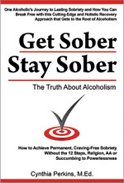What You Need to Know About Alcoholism and Hypoglycemia
Alcoholism and hypoglycemia (low blood sugar) go hand in hand, and it is this condition that is often responsible for many of the debilitating symptoms that recovering alcoholics, and other addicts experience, like anxiety, depression, shaking and nervousness, crankiness, irritability, mental confusion, uncontrollable hunger, weakness, impaired concentration, mood swings, fatigue and more. As a matter of fact, the term "dry drunk syndrome" is really the result of low blood sugar.
Not only that, hypoglycemia is often a major trigger for relapse. When blood sugar drops too low, so do neurotransmitters, and this can result in cravings for your substance of choice. In End Your Addiction Now, Dr. Charles Gant tells us that we experience hunger as an unpleasant event because there is a drop in neurotransmitters. As you have learned throughout the pages of this website, addiction to alcohol or any other substance, is caused by an imbalance or depletion in neurotransmitters in the brain and the primary goal in recovery is to restore balance to those neurotransmitters.
Your brain needs glucose to function and it extracts glucose from the food that you eat. A common misconception in society is that we need to eat sugar and carbohydrates to provide the body with glucose, but that is not really true. Eating sugar and carbohydrates is actually the cause of blood sugar problems. The body can actually convert protein and a fat byproduct called glycerol into glucose, through a process called gluconeogenesis, which is the body's preferred and healthier way of maintaining blood sugar.
When you eat sugar, or carbohydrates of any kind,(including whole grains and potatoes) they are broken down very quickly into sugar and this brings the blood glucose levels up very high, which also causes an elevation in neurotransmitters, and consequently, the "high" that is experienced from eating sweets and carbs.
The excessive level of sugar in the bloodstream prompts the pancreas to release a high level of insulin to restore balance to the blood sugar levels. The high level of insulin brings the blood sugar and neurotransmitter levels crashing down and the symptoms of hypoglycemia occur.
The reason that alcoholism and hypoglycemia are interconnected is that alcohol is a sugar - the most highly refined sugar that can be consumed. When blood sugar drops, then cravings for alcohol emerge to bring the blood sugar levels back up and eliminate the accompanying uncomfortable symptoms.
If we provide the body with adequate protein and fat in place of sugar and carbohydrates, then blood sugar and neurotransmitters stay in balance and the symptoms of hypoglycemia or cravings for the substance or choice will not ensue.
The most effective way to keep your blood sugar stable is through your diet. All foods that break down into sugar quickly should be avoided and even natural sugars found in fruit should be minimized. You can find a detailed and comprehensive discussion of the diet that is best for maintaining blood sugar and sobriety in my Ebook, Diet for Sobriety: How Eating Like a Caveman Can Help You Overcome Your Addiction, which is part of my Clean and Sober program; however, here are the general guidelines.
The diet should consist primarily of animal protein, fish, eggs, and low-starch vegetables, with a small amount of nuts, seeds and fruit. It is crucial to eat three full meals a day to keep blood sugar and neurotransmitter levels at a stable level consistently throughout the day. If you experience hypoglycemia symptoms (shakiness, irritability, headaches etc.) in between meals, then you need to eat five small meals a day until some healing takes place.
It is absolutely crucial to avoid nicotine and caffeine and because each of these trigger the liver to release high levels of its stored glucose, in the form of glycogen, into the blood stream, which prompts an insulin response and then the drop in blood sugar levels. Essentially, tobacco, caffeine and stress impact the body in the same way as sugar.
Additionally, when your blood sugar drops, your stress response system is activated, and we become less capable of accessing our coping skills, controlling our impulses and thinking before acting during this time, which puts you at high risk of resorting back to the old stand-by of drinking or drugging in the heat of the moment.
There are a variety of nutritional deficiencies that can contribute to hypoglycemia, which include glycine, chromium and glutamine and it is very common for the alcohol addicted to be nutrient deficient. Magnesium, niacin, vitamin C, B5 and amino acids are also important. Additionally, the health of the adrenal glands plays a significant role in managing blood sugar as well.
Addressing your alcoholism and hypoglycemia together can significantly reduce your risk of relapse, help you achieve more emotional stability and a higher quality of life in recovery. I have found in my own life that managing my blood sugar is one of the most crucial keys for maintaining sobriety for all my addictions, as well as for stabilizing my mood and preventing anxiety. It should be a primary area of focus in your recovery plan.


